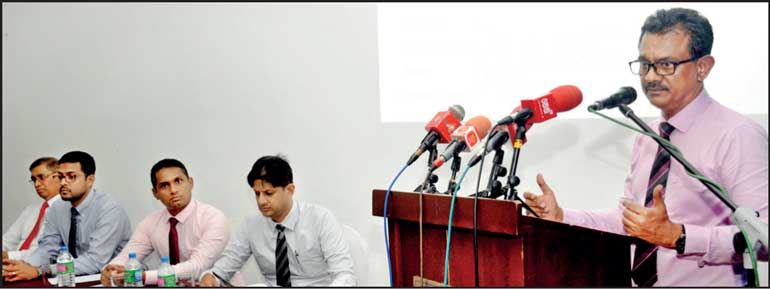Monday Feb 23, 2026
Monday Feb 23, 2026
Wednesday, 10 May 2023 00:20 - - {{hitsCtrl.values.hits}}

Association of Certified Fraud Examiners (ACFE) Sri Lanka Chapter President Dr. Udayasiri Kariyawasam address the media yesterday
– Pic by Lasantha Kumara
By Darshana Abayasingha
The newly formed Sri Lankan Chapter of the Association of Certified Fraud Examiners (ACFE) yesterday alleged that a large number of private and public companies are victims of corruption and the professional body will extend help to those who reach out.
Formed with the objective of protecting consumers, businesses and the public from financial fraud and corruption, ACFE President Dr. Udayasiri Kariyawasam said 44% of private companies and 25% of public companies in Sri Lanka are victims of corruption, and the institution will offer professional services, plus, offer training and education to those interested in becoming Certified Fraud Examiners.
The ACFE was formed in 1988 in the USA, and consists of 190 local chapters around the world. The Professional Association conducts the largest global online fraud survey, and finds that occupational fraud causes losses in excess of $ 3.6 billion annually, especially through asset misappropriation.
“The biggest problem in Sri Lanka’s public sector is the lack of accountability. Not even half of state institutions present audited financials to parliament. We often blame politicians, but even public sector officials are to blame. The civil service is just below the political rim. Politicians can be bad, but if the secretary and officials work properly there is not enough room for ministers to engage in corruption,” Kariyawasam said.
ACFE Sri Lanka Vice President Ashen Jayasekera, said fraud causes significant losses to individuals and companies alike, as fraudsters become more sophisticated. By bringing together various organisations, the ACFE hopes to strengthen efforts to combat them, and share information and resources to promote ethical business practices. One of its main objectives is to promote improved fraud detection and deterrents. The ACFE aims to become the leading anti-fraud body in Sri Lanka.
“Even the IMF has stressed the importance of promoting governance and reducing corruption in Sri Lanka. We will deliver best in class training and foster a community of anti-fraud professionals. We will also offer litigation services, as one of the primary reasons fraudsters in Sri Lanka walk free is the weak litigation process. They don’t escape because they are innocent. Fraud examination is a specialised area. That is why it has become difficult to prove some cases in court, as the required expertise is lacking. We can provide expert independent witnesses on financial frauds, financial statements and other incidents,” the ACFE President added.
The ACFE has over 90,000 members worldwide, including lawyers, auditors, investigators, executives, managers and others. The Sri Lanka chapter was formed with the approval of the governing body.
The governing members of the Sri Lanka chapter remarked that combating corruption would significantly enhance Government revenue, plus, generate savings. This would in turn help the Government to pursue a more pragmatic tax framework, they added. The situation in Sri Lanka is compounded by delays in law enforcement, insufficient use of technology and lack of political will, they said. “It is because the private sector gets involved in the process that there is bribery and corruption,” Kariyawasam noted. There are people corrupting the system, and those who are corrupted by the system; automation is a good way to prevent people being corrupted by the system, he added.